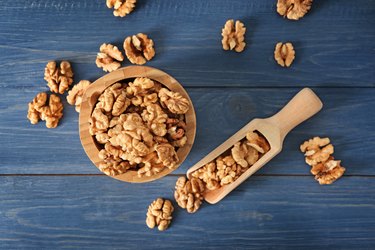
High in fat and calories, walnuts might not be considered a weight loss wonder food. But think again. Their protein and fiber may help fight hunger pangs, their healthy fats may have positive effects on hormones that control appetite, and they may stimulate areas of the brain that make food choices.
Macros for Fat Loss
Video of the Day
Food is made up of three macronutrients — fat, protein and carbohydrate. You need all three, but some types have been shown to aid weight loss more than others.
Video of the Day
Dietary fiber is a type of carbohydrate that your body can't digest, per the FDA. It doesn't have calories, but it has very important functions in human health. One of those is weight management.
Although it isn't digested, fiber swells when it comes into contact with fluids in your digestive tract. This increase in mass causes stomach distension — it may not be noticeable to you, but it is taking place inside your body during and after your meal.
This effect serves many purposes. First of all, it fills your stomach, making you feel physically full. Secondly, as explained in an article published in the Journal of Nutrition and Metabolism in January 2019, stomach distension delays the release of an appetite-stimulating hormone called ghrelin. The longer this hormone is suppressed, the longer you stay feeling full, which makes it easier for you to control your calorie intake.
Protein has similar effects. It is digested slowly and delays stomach emptying, so you remain full longer, according to Harvard T.H. Chan School of Public Health. Because of this, protein is the most satiating nutrient among the three macros, reports a research review published in Nutrition & Metabolism in November 2014.
That same review also explains other mechanisms behind protein's effects on weight and appetite:
- Protein stimulates the release of a hormone called cholecystokinin, which helps slow stomach emptying to promote longer-term satiety.
- Protein digestion burns more calories than carbohydrate or fat digestion via something called the thermic effect of food. Protein digestion increases energy expenditure over the base metabolic rate by 15 to 30 percent, compared to 5 to 10 percent for carbs and 0 to 3 percent for fats.
- Protein helps preserve and build lean muscle mass. The more muscle mass you have, the higher your resting metabolic rate.
A 1-ounce serving of walnuts provides almost 2 grams of fiber and a little more than 4 grams of protein, per USDA data. According to the recommendations, of the Food and Nutrition Board of the National Academies of Medicine, females should get at least 25 grams of fiber per day, and males need 38 grams. All adults should get 10 to 30 percent of their calories from protein, but intakes toward the upper end of the range may be better for weight loss.
Read more: 19 High-Fiber Foods — Some May Surprise You!
Walnuts, Hormones and the Brain
Contrary to popular belief, fat isn't the enemy on a weight loss diet. With 9 calories per gram, it is a richer source of energy than carbohydrates and protein, which both have 4 calories per gram, according to the USDA. But eating adequate amounts of healthy fats is not only important for the health of your heart and brain, it may also aid weight loss.
One ounce of walnuts has 18.5 grams of fat, 13.4 grams of which are polyunsaturated fatty acids, or PUFAs. This type of fat is thought to be more satiating and have more of an effect on appetite control than other types of fat due to its influence on certain hunger hormones.
Results of a small study published in Nutrition in September 2017 showed that a polyunsaturated fat-rich diet increased post-meal levels of a hormone called peptide YY which helps to control appetite and food intake. It also decreased fasting levels of the hunger hormone ghrelin, which may help control hunger in periods of very strict calorie control or fasting.
Another even smaller study, results of which were published in Diabetes, Obesity and Metabolism in January 2018, examined the effects of walnut consumption on the brain using magnetic resonance imaging (MRI). Following the ingestion of a walnut smoothie, participants were shown food and non-food items. When participants viewed desirable food items, scans showed increased activity in an area of the brain in charge of exerting restraint.
The researchers did not explain exactly what is responsible for these effects, nor whether they are specific to walnuts or extend to other tree nuts. At this point, there's not enough evidence to show that walnuts could have significant real-world effects on weight loss.
But, they are a good source of protein, fiber and plant-based healthy fats. As with any high-calorie food, it's important to stick to a single serving and make sure you account for the 185 calories in that serving when you're planning the other foods you will eat during the day.
Read more: Walnuts: Health Benefits and Nutrition Facts
- FDA: "Dietary Fiber"
- Journal of Nutrition and Metabolism: "The Role of Fiber in Energy Balance"
- Harvard T.H. Chan School of Public Health: "Protein, Carbs, and Weight Loss"
- Nutrition & Metabolism: "A High-Protein Diet for Reducing Body Fat: Mechanisms and Possible Caveats"
- University of New Mexico: "Controversies in Metabolism"
- USDA: "Nuts, Walnuts, English"
- National Academies of Medicine: "Dietary Reference Intakes (DRIs): Recommended Dietary Allowances and Adequate Intakes, Total Water and Macronutrients"
- USDA: "How Many Calories Are in One Gram of Fat, Carbohydrate, or Protein?"
- Nutrition: "Hunger and Satiety Responses to High-Fat Meals After a High-Polyunsaturated Fat Diet: A Randomized Trial"
- UNC Health Talk: "Does Intermittent Fasting Work?"
- Diabetes, Obesity and Metabolism: "Walnut Consumption Increases Activation of the Insula to Highly Desirable Food Cues: A Randomized, Double-Blind, Placebo-Controlled, Cross-Over FMRI Study"